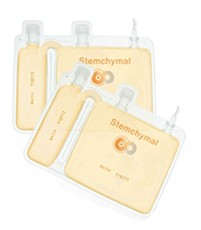Stemchymal® for Huntington’s Disease (HD)
Stemchymal® 應用於亨氏舞蹈症之治療
- 認識亨氏頓舞蹈症
Background of HD
亨氏頓舞蹈症(Huntington’s Disease, HD)是一種由HTT基因當中帶有CAG重複序列所引起的遺傳性疾病,最終導致大腦神經細胞退化。疾病的早期表徵包括情緒或心智能力的改變,隨後逐漸缺乏協調和步態不穩。 全球亨氏頓舞蹈症的盛行率為每10萬人5~10例,好發族群略有不同,例如西歐後裔的患病率高於亞洲和非洲後裔。Huntington’s disease is an inherited disease that caused by abnormal CAG repeat sequence in the HTT gene, which eventually lead to nerve cells degeneration in the brain. The early sign of disease including change of mood or mental abilities, following with gradually lack of coordination and unsteady gait. The worldwide prevalence of HD is 5~10 cases per 100,000 persons without gender difference. Besides, prevalence of HD showed geographically difference that Western European descent displayed higher prevalence rate than Asian and African descent.
- 亨氏頓舞蹈症的臨床照護
Clinical Management of HD
與SCA的情況類似,目前臨床上尚未有任何可以延緩或阻止 HD 進展的治療方法。 目前,HD治療方是主要症狀管理為主,包括:使用tetrabenazine 和 deuterabenazine來控制舞蹈病(不自主運動障礙); 使用抗精神病藥物緩解舞蹈病並幫助控制幻覺、妄想和暴力爆發;使用藥物來控制抑鬱和焦慮。Unfortunately, no curative therapy has been approved which can delay or halt the progression of HD. Currently, symptomatic management of HD including: using tetrabenazine and deuterabenazine to control chorea; applying antipsychotic drugs to ease chorea and help to control hallucinations, delusions, and violent outbursts; using drugs to control depression and anxiety.
- 仲恩在亨氏頓舞蹈症的研究進展
Steminent’s progress in HD
仲恩建立了體外和小鼠動物模型來驗證使用 Stemchymal® 治療 HD 的潛力。 經研究證明, Stemchymal® 可透過多種機制保護神經元,包括減少神經細胞氧化壓力和增強自噬途徑清除異常蛋白質。 這些發現,連同在 SCA 模型中的經驗,我們相信 Stemchymal® 對 HD 的治療具有潛力。我們現在正在進行動物研究來證明我們的概念。 到目前為止,我們在 HD 小鼠模型中取得了良好的結果,這強烈鼓勵我們啟動臨床試驗以幫助HD 的病患。Steminent have established in vitro and in vivo models to validate the therapeutic potential of using Stemchymal® in the treatment of HD. By using well-established Stemchymal®-neuron coculture system, we have demonstrated that Stemchymal® protects neuron though multiple mechanisms, in terms of reduction of ROS and enhancement of autophagy pathway. These findings, together with the experience in SCA model, Steminent believe that Stemchymal® may have therapeutic benefit on HD. Until now, Steminent got positive results in a mouse model of HD, which strongly encourage us to initiate clinical trials to help patients who suffer with HD.


